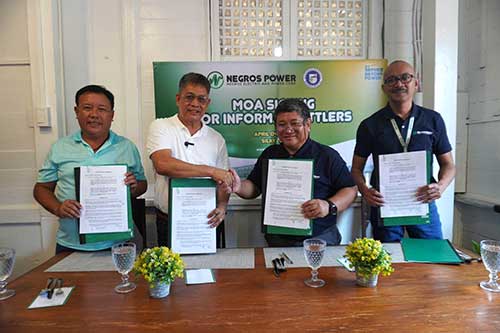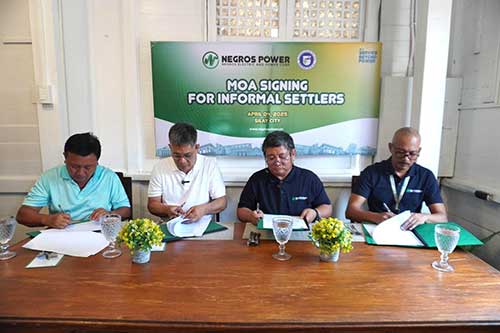
SILAY CITY — In a major step toward inclusive development and public safety, Negros Electric and Power Corporation (Negros Power) has signed a landmark Memorandum of Agreement (MOA) with the Silay City Government to provide safe and legal electricity to over 5,000 informal settler households.
The agreement was formalized on April 4, 2025, in a ceremony attended by Silay City Mayor Joedith C. Gallego, Councilor Mike Maravilla, and key city officials, along with Negros Power President and CEO Roel Z. Castro and Vice President and COO Engr. Bailey del Castillo.
The initiative aims to eliminate dangerous, makeshift electrical connections in underserved communities and replace them with reliable, metered power access.
“This MOA is a testament to our shared goal of building a more secure, dignified, and sustainable future for all Silaynons,” said Mayor Gallego.
“Legal electrification is a basic right and a vital foundation for further development in these communities,” he added.
Under Republic Act No. 12011, Negros Power holds the franchise to operate the electric distribution system in Silay City and other areas in central Negros, empowering it to ensure equitable access to electricity regardless of land ownership status.
“This agreement is about more than just powering homes,” said Castro.
“It’s about enabling dreams, improving safety, and unlocking economic and educational opportunities for thousands of families,” he added.

The MOA outlines the responsibilities of both parties in facilitating legal connections for qualified informal settlers—those living on land they do not legally own but occupy with the tolerance of government or private entities.
Negros Power will identify qualified beneficiaries, submit validated lists to the city government, and require basic documentation such as a government-issued ID, residency certificate, housing photo, security deposit, and a Temporary Electrical Permit.
The Silay City Government, through its City Engineer’s Office and Office of the Building Official, will expedite document issuance, verification, and inspections, committing to complete requests within five working days.
To streamline implementation, the mayor may issue an executive order simplifying the process of securing temporary permits for informal settlers.
Importantly, the MOA does not diminish any legal protections or benefits currently extended to informal settlers under national laws.
Silay City, a third-class component city with 16 barangays, has long struggled with fire risks and community hazards tied to illegal electrical connections.
By integrating informal households into the formal energy grid, the initiative not only reduces public safety risks but also opens access to government programs tied to legal residency and utility services.




















